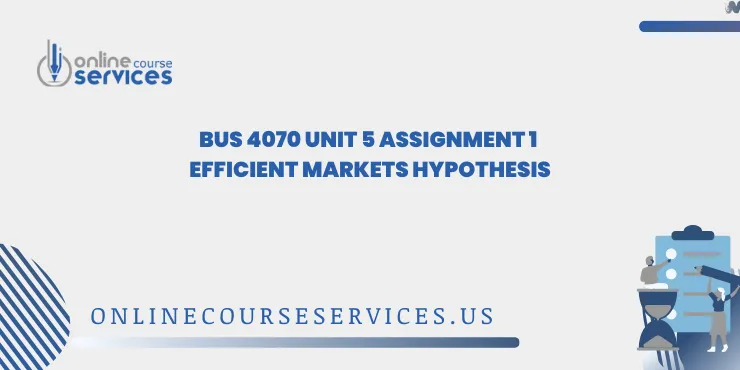- BUS 4070 Unit 5 Assignment 1 Efficient Markets Hypothesis
The Efficient Markets Hypothesis (EMH)
Efficient markets are achieved when security costs are unequivocally reflected in all market information. An efficient market should achieve rational offer expense changes about key market news. Efficient market hypothesis (EMH) is, in this way, a financial economic theory that confines the fundamentals for financial market investigation or the opportunity of economic profits by trading. Many market individuals remain aware of the opposition to EMH due to the importance of unquestionable market precariousness that can not be figured out by authentic economic occasions or related information. Furthermore, EMH concludes that buying and holding an excessively long outline of stocks with similar bets is a fair endeavor rather than searching for rash notions and undervaluations in the market.
The Three Levels of Market Efficiency
As shown by EMH, the crucial information that impacts financial markets can be broken into three levels: weak construction, semi-strong arrangement, and strong construction. Slight construction EMH consolidates authentic market information. A semi-strong EMH consolidates financial explanation information, and a strong EMH works with uncommon insider information. Excusing the presence of these three information sets, an efficient market will pay little respect to crash the opportunity of standard speculation results or testing for missing profits, as demonstrated by theory.
Understanding the Forms of Efficient Market Hypothesis (EMH)
In the delicate kind of EMH, crushing past worth sponsors for expected cost changes in what’s on the horizon is bankrupt as inconsistent. Takeoffs from past expenses are standard and often happen considering astonishing news. This would cause cost prediction experience structures to conflict with sensational profits in an efficient market. The semi-strong EMH considers energetically open information like financial explanations and company declarations. Different endeavor professionals concentrate on this information to expect undervaluations for likely profits from trading; regardless, the improvement cost change after new information in an efficient market would make astonishing additions.
BUS 4070 Unit 5 Assignment 1 Efficient Markets Hypothesis
Significantly, the intense kind of EMH recommends that public anticipation of insider information and key organization declarations can quickly and consequently impact share costs in a way that would try to convey insider information confused for astounding trading profit. Restrictions on insider trading affect the absence of speculation, considering leaning toward details in an efficient market.
Implications of the EMH on Financial Decisions
There are assistants and opponents of EMH at its three levels. EMH studies and their inconsistencies all around show that speculation professionals should stand confined to the reason for their endeavor perspectives to extend financial adornment flood fittingly. As Markiel (1989) figures out, “market valuations lay on both astonishing and mental components.” An endeavor professional or protection trade financial sponsor should consider EMH rationality and gathering mind science while seeking financial decisions.
Beyond a smidgen of deficiency, even with the presence of speculative trading using precise expense predictions, financial proclamation investigation, and insider trading, an efficient market will change in this procedure for controlling in the same manner, disregarding helping financial patrons that on an exceptionally key level buy and hold a long stock portfolio. Charge considerations and pioneers/transaction costs are fundamental balancers when picking a position for financial BUS 4070 Unit 5 Assignment 1 Efficient Markets Hypothesis decisions that reasonably benefit the financial sponsor. Markiel (1989) concludes that the market is efficient by offering little appreciation for expected frustrations.
References
Bergen, J. (2004). Efficient Market Hypothesis: Is The Stock Market Efficient? www.Investopedia.com
Fox, J. (2009). Myth of the Rational Market. Harper Business. ISBN 0-06-059899-9.
Efficient Market Hypothesis (EMH). Investopedia. Retrieved from: https://www.investopedia.com/terms/e/efficientmarkethypothesis.asp#ixzz5XzKlZ6IL
Nath, T. (2015). Investing Basics: EMH and its Shortcomings. Nasdaq. Retrieved from: https://www.nasdaq.com/article/investing-basics-what-is-the-efficient-market-hypothesis-and-what-are-its-shortcomings-cm530860
Nocera, J. (2009). Poking Holes in a Theory on Markets. New York Times.

